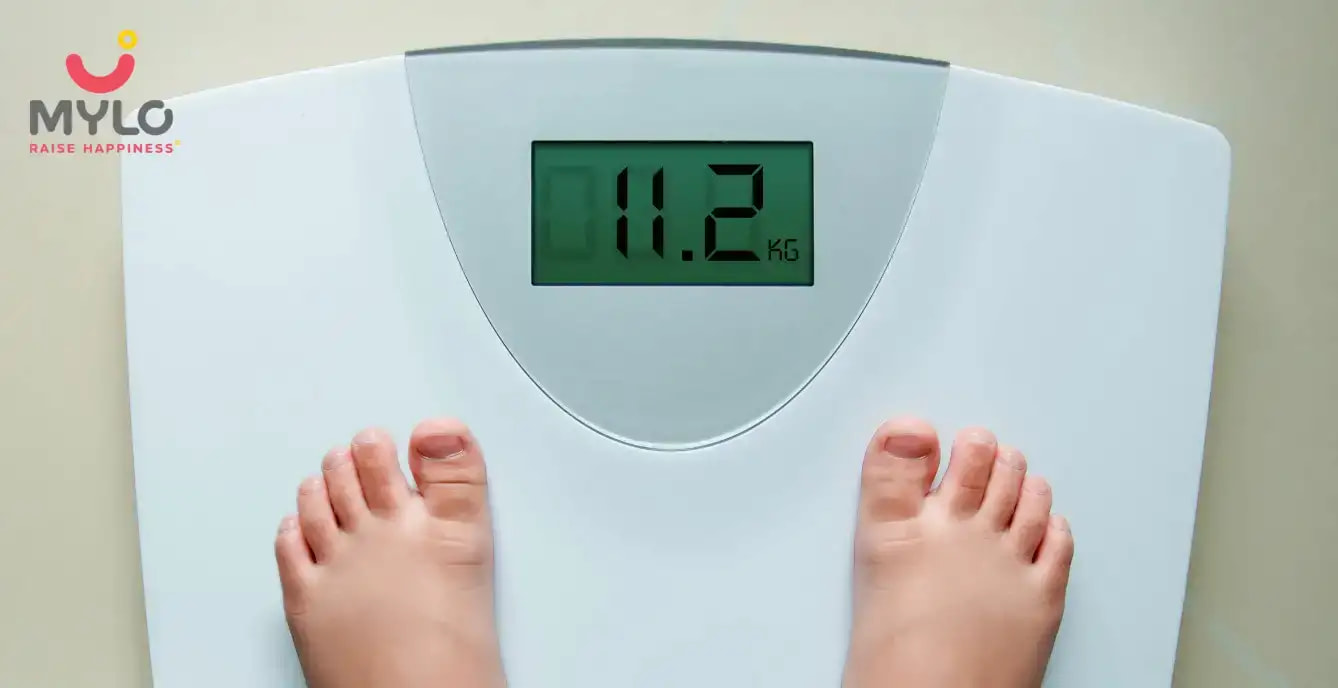Home

Health Tips

What to do if your toddler is overweight?
In this Article

Health Tips
What to do if your toddler is overweight?
Updated on 17 March 2023



Medically Reviewed by
Dt. Mansi Goyal
Specializes in Critical Gestational Diabetes, PCOS Patients - BSC| MSC (Home Science, Food & Nutrition)
View Profile

Which parent wouldn't be happy seeing their munchkin put on weight? But how much weight is good weight? And how much is worrisome?
As per The Centers for Disease Control and Prevention (CDC), you need to calculate your baby's BMI (Body Mass Index) to conclude if your baby is overweight or not. All you have to is enter your baby's exact height and weight measurement into CDC's BMI Percentile Calculator. What you will get is your baby's BMI Percentile in accordance with his age and gender.
Your baby is termed overweight if they are at or above the 85th percentile and obese if he is at or above the 95th percentile.
Causes of an overweight toddler
Your toddler might be overweight due to the following reasons:
1. Irregular meal time
if your child does not have a proper meal schedule and eats all through the day, it can be one reason why your baby is putting on excess weight.
2. Portion size
Eating more than what your baby needs can be a problem in the long run. The larger the portion size, the more the calorie intake. If the calorie intake is more, your child's weight is obvious to skyrocket.
3. Lack of physical exercise
Having limited screen time is essential for a child's growth. Experts recommend 3 hours of physical activity for kids. Of course, the 3 hours don't have to be continuous but can be broken down into small sessions.
4. Hereditary
Excess weight can also be hereditary, that is, genetic. If parents are overweight, there is a full chance that they may pass this to their child.
What can you do if your baby is overweight?
Here are a few tips to help you manage weight gain in your overweight toddler:
-
Take care of your baby's nutritional needs. Ensure that you concentrate on healthy food options such as fruits, vegetables, whole grains, and low-fat dairy foods. Try avoiding junk food, processed food, fizzy drinks/soda, high-fat foods, sweets, and sugar.
-
Suppose your baby is bottle-fed with cow milk; cut down on the milk. 350ml to 400ml of cow milk is more than sufficient for your child.
-
Have six mini-meals in a day instead of 3 big ones. This will protect your baby from overeating.
-
Avoid bribing your child with treats. This makes your baby a picky eater but also spoils his food habits.
-
Limit your baby's screen time. One hour a day or less looks more than enough for a baby. If possible, ban it completely.
-
Try and play with your child. Keep him physically active. You can take your baby for a walk or even to a park. Cycling is a good option too.
-
Ensure proper sleep patterns for your child. If your baby is not sleeping properly, this may be one reason why they are putting on some extra weight.
Now that you know the reasons why your baby is overweight and also the solutions for the same, it is time to gear up and get yourself in action, a super Mommy mode!





Medically Reviewed by
Dt. Mansi Goyal
Specializes in Critical Gestational Diabetes, PCOS Patients - BSC| MSC (Home Science, Food & Nutrition)
View Profile


Written by
Priyanka Verma
Priyanka is an experienced editor & content writer with great attention to detail. Mother to an 11-year-old, she's a ski
Read MoreGet baby's diet chart, and growth tips

Related Articles
RECENTLY PUBLISHED ARTICLES
our most recent articles

Daily Care Tips
Electric toothbrush for Toddlers: Is it safe?

Health Tips
Teaching good eating habits to your kids

Books
How to Introduce Books to Your Child?

Social Development
This is how you can talk to your child about strangers

Diet & Nutrition
A healthy meal plan for your 2-year-old

Pregnancy Journey
Music In Pregnancy: How Does Music Affect Your Baby’s Brain
- What is the importance of measuring basal body temperature during conception?
- Signs That Children Are Ready for Potty Training
- Physical Development In Early Childhood
- What Is Social Development in Early Childhood?
- How to overcome anxiety and prepare your baby for preschool? 7 unique tips for handling the initial days of preschool.
- Obstetric-Cholestasis: Causes, Symptoms & Treatment
- Adjusting kids to a school can be challenging. Here are 7 tips to help your child adjust to school.
- Crying During Pregnancy Causes, Effects & Treatment
- Infant Choking: Prevention & Causes
- Indian Food Chart for Your 7-Month-Old Baby – Week 2
- 6-Month-Old Baby Food Chart/Meal Plan - Week 4
- Ways in Which You Can Avoid Gassiness During the Pregnancy Period.
- Extinguishing pregnancy heartburn in the most effective way!
- Heartburn during pregnancy is common... but the night-time heartburn is a pain. Here's how to control it


AWARDS AND RECOGNITION

Mylo wins Forbes D2C Disruptor award

Mylo wins The Economic Times Promising Brands 2022
AS SEEN IN
















- Mylo Care: Effective and science-backed personal care and wellness solutions for a joyful you.
- Mylo Baby: Science-backed, gentle and effective personal care & hygiene range for your little one.
- Mylo Community: Trusted and empathetic community of 10mn+ parents and experts.
Product Categories
baby carrier | baby soap | baby wipes | stretch marks cream | baby cream | baby shampoo | baby massage oil | baby hair oil | stretch marks oil | baby body wash | baby powder | baby lotion | diaper rash cream | newborn diapers | teether | baby kajal | baby diapers | cloth diapers |








